Products
A look at the newest spectroscopy-related products.
Demountable ICP torch
A demountable ICP torch from Glass Expansion includes standard quartz outer tubes that can be replaced when worn. According to the company, the ceramic outer tubes will withstand harsh conditions. The torch is available for specific PerkinElmer, Spectro, and Thermo Fisher Scientific ICP–OES and ICP–MS systems. Glass Expansion, Pocasset, MA;
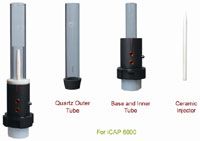
Low-volume cuvette
Hellma's TrayCell cuvette requires a sample volume of 0.7 μL. According to the company, the surface tension of the sample forms a repeatable optical path of 0.2 mm or 1 mm. Applications include biotechnology, drug discovery, and forensic investigations. The lower part of the cuvette reportedly contains fiber optics and mirrors for the UV that interface to an upper part that contains collimating optics. The parts are optically connected through the sample. Hellma USA, Plainview, NY;
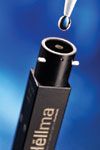
Mercury analyzer
The model RA-3420 Gold+AFS mercury analyzer from Nippon Instruments North America is designed for analysis according to EPA Method 1631E. Samples are automatically digested and oxidized followed by automated analysis by cold vapor atomic fluorescence spectroscopy. According to the company, no user intervention is required. Nippon Instruments North America, College Station, TX;

UV crosslinker
The Spectrolinker XL-1000 UV crosslinker from Spectronics Corporation is designed for biotechnology research. Applications include elimination of PCR contamination, crosslinking of DNA and RNA, nicking ethidium bromide–stained DNA, gene mapping, RecA mutation screening and testing, UV sterilization, UV-induced polymerization, UV intensity monitoring, and other UV-dosage applications. Spectronics Corporation, Westbury, NY;
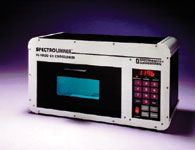
DC arc spectrometer
The Prodigy DC arc spectrometer from Teledyne Leeman Labs is designed for fast trace metals analyses of solid samples. The instrument reportedly can analyze samples including ceramics, refractory powders, graphite, geological materials, nuclear materials, and soils, sludges, and ashes. Teledyne Leeman Labs, Hudson, NH;
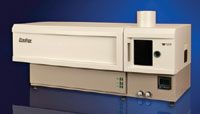
Mercury analyzer
The Hydra IIbAA automated mercury analyzer from Teledyne Leeman Labs is designed to provide 1 ppt detection limits and fast sample throughput. The instrument includes a 270-position autosampler. According to the company, the instrument's software automates the analytical process from method development to final report generation. The analyzer reportedly can be upgraded to perform direct solids analysis. Teledyne Leeman Labs, Hudson, NH;
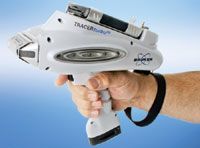
Raman analyzer
Kaiser's RamanRxn2 general purpose Raman analyzer is designed for method development and reaction monitoring. The instrument features automatic calibration and is available in either four-channel or hybrid configuration. In the hybrid configuration, the analyzer can be used for small-spot Raman sampling and PhAT-based wide-area sampling. In four-channel configuration, the analyzer reportedly can be used to study mechanisms, refine reaction pathways, and optimize yields. Kaiser Optical Systems, Inc., Ann Arbor, MI;
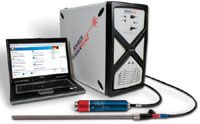
Handheld Raman system
The TRicorder handheld Raman system from BaySpec features no moving parts, volume phase gratings, a narrowband fiber laser, an ATR probe interface, battery operation, and a PC tablet interface. The system requires no periodic calibration. A Windows-based handheld PC is included with the system. The system reportedly can be used to identify chemicals through transparent and translucent materials, is capable of single-handed or wireless analysis, and can identify chemicals in mixtures with low concentrations. BaySpec, Inc., Fremont, CA;
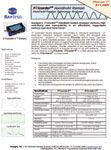
MS software
LECO's ChromaTOF 4.20 software integrates acquisition, processing, and reporting features and includes functions for signal deconvolution, peak identification, semiquantitation, and EPA reporting. The software is supplied with the company's Pegasus HT GC–MS and 4D GC×GC–MS systems, TruTOF HT GC–MS systems, GC×GC system, and Unique HT LC–MS instruments and will also be available as an upgrade for existing versions of the software. LECO Corporation, St. Joseph, MI;
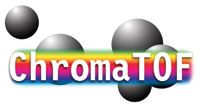
Gas cell
A mini gas cell with PTFE stopcocks from New Era Enterprises is designed for use with gas samples such as hydrochloric acid that will react with the lubricant used in all-glass stopcocks. According to the company, the cell has a 10-cm path and a 30-mL volume.The cell reportedly can be used to analyze pure gases or gas mixtures with component concentrations greater than 1% and it allows for experiments at slight variations from standard pressure. New Era Enterprises, Inc., Vineland, NJ;
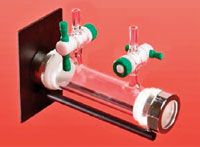
Fluorescence lifetime system
The TemPro lifetime system from HORIBA Scientific uses time-correlated single photon counting for fluorescence measurements. According to the company, the desktop system is capable of measuring lifetimes ranging from picoseconds to seconds. The instrument includes interchangeable pulsed laser diode and LED light sources that cover discrete emission wavelengths ranging from 255 nm to near-IR. Optional polarizers enable measurement of rotational correlation times. HORIBA Scientific, Edison, NJ;
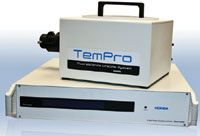
ICP–AES method development
HORIBA Scientific's CLIP (collection of line intensity profiles) is designed to assist analysts in the development of methods for high-resolution sequential ICP–atomic emission spectroscopy. According to the company, the profile of each line is calculated according to the instrument's configuration, including focal length, slit combination, diffraction grating, and order used. The product is available as an upgrade module for the company's ULTIMA instrument. HORIBA Scientific, Edison, NJ;

Raman software
Thermo Fisher Scientific's OMNIC Specta software is designed for Raman applications. The software features multicomponent searching capability, a contaminant identification capability, and an interface that reportedly enables analysts to visualize the workflow on one screen, including data collection, processing, and final report. According to the company, the software automatically indexes all spectral information on a user's system. Thermo Fisher Scientific, Waltham, MA;
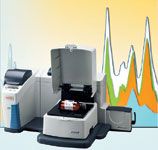
Chemometric software
WITec's Project Plus software is designed for data evaluation and chemometric image processing. The software includes features for multivariate data analysis for confocal Raman imaging and scanning probe microscopy such as cluster analysis and principal component analysis. The software is also available as an add-on package for the company's Project data evaluation software. WITec, Savoy, IL;
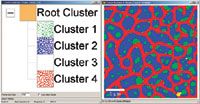
Desktop high-voltage power supply
The USBHV high-voltage power supply from EMCO High Voltage Corp. reportedly requires only a USB cable to operate and power the unit. After the control software has been installed on a Windows-compatible computer, users reportedly can enter the desired output voltage and click the enable button to activate the unit. The software displays a continuous read-back of the generated voltage. The power supply is available with programmable ranges of 0–200 V, 0–500 V, 0–1000 V, 0–1250 V, and 0–2000 V at 1 W of output power. EMCO High Voltage Corp., Sutter Creek, CA;
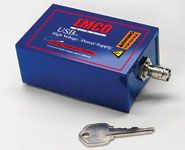
UV–vis spectrophotometer
Shimadzu Scientific Instrument's BioSpec-nano UV–vis spectrophotometer is designed for the quantitation of nucleic acids. The instrument reportedly requires a sample volume of 1 μL, for a pathlength of 0.2 mm, or 2 μL, for a pathlength of 0.7 mm. The sample is pipetted onto the instrument's measurement plate. According to the company, sample measurement time is 3 s. The instrument includes dedicated software for operational functions. Shimadzu Scientific Instruments, Columbia, MD;

XRF system
The M4 Tornado micro X-ray fluorescence system from Bruker AXS is designed for nondestructive, position-sensitive elemental analyses on solid or liquid samples, particles, inclusions, and coatings. Applications include microelectronics, RoHS, forensics, and geology. The instrument includes a vacuum sample chamber and a silicon drift X-ray detector. The instrument reportedly can be used for single-spot measurements as well as automated multiple-point measurements. Bruker AXS, Inc., Madison, WI;

Portable Raman spectrometer
The innoRam portable Raman spectrometer from B&W Tek features an integrated touch-screen computer and is designed for research-grade performance. The spectrometer reportedly includes a TE-cooled CCD that provides a spectral resolution of 2 cm–1 . According to the company, the system's laser and Raman probe have a near-excitation cut-on at 65 cm–1 . B&W Tek, Inc., Newark, DE;
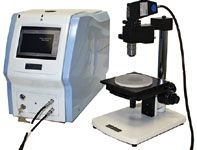
Power feedthrough
Insulator Seal's Micro Midgy feedthrough is designed for miniature high-voltage applications. The feedthrough reportedly has a 12-kV rating and is available in multiple flange configurations. Features include UHV-compatible materials, an ultracompact design, multiple feedthroughs on a flange, and an air exclusion boot connector. Insulator Seal, a division of MDC Vacuum Products, LLC, Sarasota, FL;
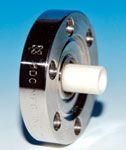
Temperature controller
The PTC Series temperature controller from Wavelength Electronics reportedly is a compact chassis mount package that can be paralleled to drive up to 20 A current. The temperature controller is designed to operate with the company's PLC Series laser diode drivers. According to the company, the controller provides user-configurable setpoint, a TTL-compatible remote disable, adjustable proportional gain, and PI control with large load/thermal delay circuitry. Wavelength Electronics, Bozeman, MT;

Standards catalog
SPEX CertiPrep's 2009–2010 Inorganic/Organic flipbook catalog lists the company's inorganic and organic products, general ordering information, custon standard quote request form, and new products. SPEX CertiPrep, Inc., Metuchen, NJ;

ATR accessory
The GladiATR Vision attenuated total reflection device is designed to couple small-area infrared analysis with simultaneous viewing. According to the company, the device's diamond crystal enables analysis of thick or nontransparent samples. The accessory reportedly is compatible with most FT-IR spectrometers. Pike Technologies, Madison, WI;
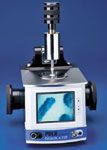
Silicon drift detector
The XR-100SDD Silicon Drift Detector (SDD) from Amptek reportedly enables extremely high count rate applications with high energy resolution. According to the company, the product is designed for XRF applications from OEM handheld instruments to benchtop analyzers. Amptek, Inc., Bedford, MA;

Fluorescence measurement system
Hitachi's Quantum Yield measurement system for the company's model F-7000 fluorescence spectrophotometer is designed for fast measurements and calculations of internal and external QY, absorption, absorption amount, and fluorescent amount of powder samples. The system includes the accessories required for spectral correction and quantum yield measurements in the range of 240–800 nm. Hitachi High Technologies America, Inc., Pleasanton, CA;

Portable Raman instrument
The portable EZRaman-I instrument from Enwave is designed to provide approximately 50 times better sensitivity than most other portable Raman instruments. According to the company, the instrument's spectral resolution is approximately 6 cm–1 and its spectral range is 100–2000 cm–1 . Enwave Optronics, Inc., Irvine, CA;
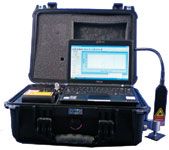
Database
ICDD's PDF-4/Organics 2009 database contains 370,844 entries and is designed for rapid materials identification. According to the company, the database can be used for formulation analysis, drug and tablet stability, and identification of polymorphs, excipients, and drugs. Other possible applications include the identification or fingerprinting of crystalline and noncrystalline phases. The database reportedly was produced by combining drug active compounds with polymers, common inorganic salts, excipients, and pharmaceuticals. ICDD, Newtown Square, PA;
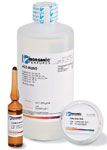
FT-IR spectrometers
ABB Analytical's general-purpose laboratory Fourier-transform IR spectrometers are designed for ease of use, reliability, and constant results. Two versions are available: the MB3000 system is for analyses in the mid-IR range, and the MB3600 system is for near-IR analyses. The company's Horizon MB FT-IR software can be used with the spectrometers to facilitate data acquisition, processing, and sample analysis. ABB Analytical, Quebec, Canada;
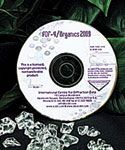
Cryogenic grinding mill
The CryoMill from Retsch is designed for cryogenic grinding. The mill is continually cooled with liquid nitrogen from an integrated cooling system before and during the grinding process. Grinding parameters can be stored, and LEDs in the display indicate the current state of operation. The mill has a vibrational frequency of 25 Hz. Samples mainly are ground by impact but are also ground by friction, which reportedly provides finer grind sizes. The mill includes one grinding station for grinding jar volumes of 25, 35, and 50 mL. An optional adapter holds as many as four 5-mL grinding jars. Retsch, Inc., Newtown, PA;
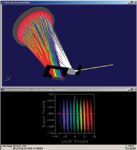
Custom standards
Custom inorganic standards from Inorganic Ventures can be used in applications such as ICP, ICP-MS, atomic absorption, and ion chromatography. Each standard is supplied with a certificate of analysis that details NIST traceability, certified values, and trace impurities. The standards reportedly are manufactured in a "green" manufacturing facility. Inorganic Ventures, Lakewood, NJ;
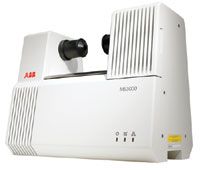
Hard-clad silica fibers
Large-core multimode hard-clad silica and silica/silica fibers from Fiberguide Industries are designed to provide increased fiber strength, reduced static fatigue in humid environments, and robust bonding to prevent pistoning. The fibers are available as hard-clad silica with N.A. of 0.39 and hard-clad silica/silica with N.A. of 0.22. Fiberguide Industries, Inc., Stirling, NJ;
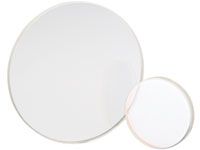
Spectroscopy modeling software
Photon Engineering's FRED Optimum software is designed for modeling all types of spectroscopic systems. The 3D CAD optical engineering software can simulate the propagation of light through any optical–illumination system modeling source radiative phenomena and arbitrary optomechanical geometry with algorithms to model fluorescence, polarization, interference, scatter, diffraction, transmission, reflection, and absorption at any surface. Photon Engineering, LLC, Tucson, AZ;
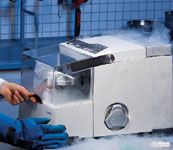
CCD spectrometer
Edmund Optics' back-thinned CCD spectrometer for UV–NIR measurements is designed to minimize stray light to improve throughput. The spectrometer's software is configurable for high dynamic or high sensitivity modes. According to the company, the spectrometer can be used for various UV–vis–shortwave NIR applications. Edmund Optics, Barrington, NJ;

Neutral density filters
Circular variable neutral density filters for laser applications such as multiphoton microscopy and ultrafast spectroscopy are available from Newport Corporation. The filters include a metallic coating on a 2-mm fused-silica substrate and reportedly can be used with short pulses. The filters are available in multiple sizes and optical density variations and are designed to attenuate low energy laser light in the 200–2000 nm range. Newport Corporation, Irvine, CA;
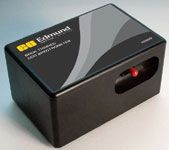
Handheld XRF instrument
Bruker's TRACERturboSD handheld X-ray fluorescence instrument includes the company's Xflash silicon drift detector. The unit is designed to provide fast analysis of sophisticated metals such as light element alloys without the use of a vacuum or helium attachment. Bruker AXS, Kennewick, WA;
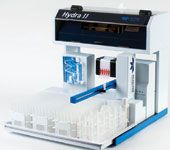
Digital line scan camera
Sensors Unlimited's model Su 1024LDH SWIR digital line scan camera is designed for high-speed NIR spectroscopy and machine vision. The camera includes an uncooled linear InGaAs image sensor system with 1024 25 μm × 25 μm pixels. Quantum efficiency reportedly is greater than 70% from 1.0 to 1.6 μm. The camera reportedly sees beyond the visible range and outputs 14-bit Camera Link at frame rates greater than 46,000 lines/s. Sensors Unlimited, part of Goodrich Corporation, Princeton, NJ;
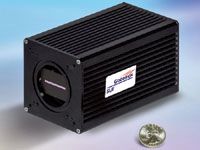
Handheld FT-IR system
A2 Technologies' Exoscan handheld FT-IR system is designed for applications in which analyzing the condition of a surface is critical, including nondestructive surface testing and molecular analysis of advanced composites and metals. A2 Technologies, Danbury, CT;
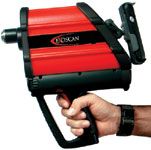
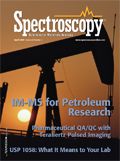
Best of the Week: AI and IoT for Pollution Monitoring, High Speed Laser MS
April 25th 2025Top articles published this week include a preview of our upcoming content series for National Space Day, a news story about air quality monitoring, and an announcement from Metrohm about their new Midwest office.
LIBS Illuminates the Hidden Health Risks of Indoor Welding and Soldering
April 23rd 2025A new dual-spectroscopy approach reveals real-time pollution threats in indoor workspaces. Chinese researchers have pioneered the use of laser-induced breakdown spectroscopy (LIBS) and aerosol mass spectrometry to uncover and monitor harmful heavy metal and dust emissions from soldering and welding in real-time. These complementary tools offer a fast, accurate means to evaluate air quality threats in industrial and indoor environments—where people spend most of their time.